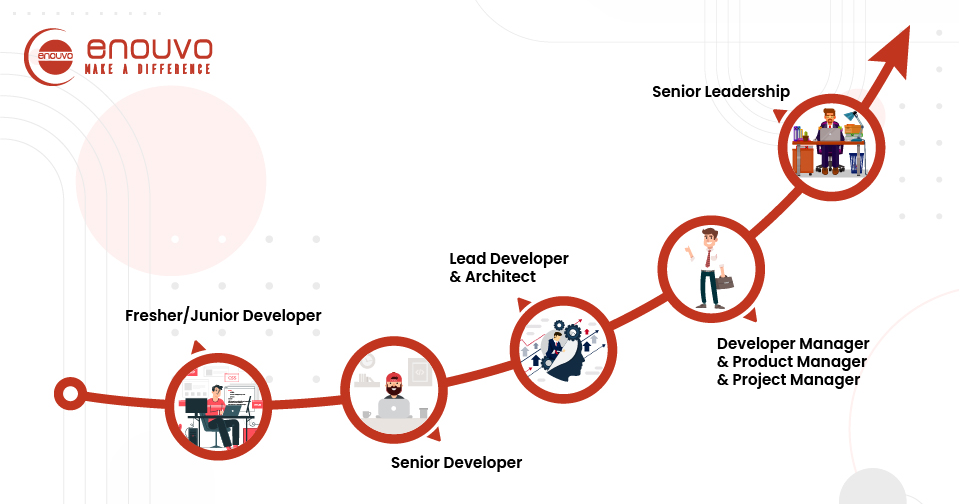The fact that college students, who currently learning or just graduating, would find it difficult to imagine about the career path for developer. I’ve written this article to address some of the questions you often pose, like:
- What is my position after i graduate? How will i work?
- With long term experience, will i be promoted?
- I don’t like managing people, i just like to code, how should i be oriented?
Actually, aware of the developer’s career path, you can easily shape your future. So, you can start developing your skills and put your energy into the path you have chosen.

A typical career path for developer:
Fresher/Junior Developer

Notably, college students, who go to intern or just graduate, often get this title. Junior developers with years of experience are usually around 6 months – 1 year. In fact, salary depends on your ability, usually from 300-500$. And typical
requirements for a junior developer include:
- The ability to write simple scripts.
- Understanding of the expected application life cycle.
- Basic understanding of database and application services, such as queues and caching.
Hence, people often don’t ask you too far, because of inexperience. As a junior’s role is to understand the current project, simple code, easy modules, fix bugs, but probably have senior help/review. In addition, at the junior level, you’re
trying to take advantage of writing technology, learn how to work. Finally, you should learn from the experience of a senior developer.
Senior Developers

Especially, if you have about 1-3 years of coding experience, you will be called a Developer. However, many developers go directly to Team Leader or Senior, depending on the company. Indeed, at this stage, you have gone through several
projects, quite familiar with some technologies. The developer’s salary is around $ 600-900 depending on the company. And,the typical requirements for lead developer positions include:
- Many years of professional programming experience.
- Demonstrates subject matter expertise.
- Possessing the same technical skills that a senior developer may have.
- Ability to conceptualize, plan and build software to solve complex problems.
At this level, you’ve coded some more complex, participated in meetings, code reviews, customer discussions, etc.So that, this is the stage where you need to consolidate your knowledge, experience, and build a reputation for the next career
ladder phase.
Development Team Lead, Software Development Manager

Speaking about management, this is the next logical and conventional step along the career path for software developers.More importantly, there are different focuses and responsibilities for managers that include:
- Managing large-scale projects.
- Managing teams of developers.
- Hiring and firing developers.
To illustrate, the mid-level manager holds the process and productivity track and reports to a senior manager. Beside, their usual task is to coordinate the application needs with the development team as well as the project leader. This
position requires great skills and the ability to effectively mediate conflicts. Additionally, the role of the developer manager is also to remove new members and add them to the team whenever necessary. However, one of the big down side of
becoming a mid-level boss is that you may have to put a stop to others. For many, this may be a psychological and emotional challenge but can be a powerful leadership ability when mastered.
The following table is some additional information about these positions:
Manager | Technical |
Team LeaderYou become the leader of a small team, about 3-6 members. On the other hand, except for the code, you also must meet with superiors, report to customers, subordinates. At this stage, you will gradually learn some leadership | Senior DeveloperAfter a period of work, you are master and deeply understand and broaden many technologies + processes. In this position, except for the ability to code “divine”, you must know how to design and solution. Besides, you also |
Project ManagerUp to this position, you will have very little or almost no time to code.In fact, most of your time is spent on reporting, management, leadership, sometimes you are forced to interview some candidates to recruit members for | Technical LeadAs a technical lead, you need to know about deep and wide technology because you are the one who chooses technology, process … for a project.Also, big decisions about the design, code structure … will be your |
Manager/DirectorManager/DirectorCongratulations, in this position you have been called “boss, superiors, leaders, …”. And now you will not have the time to code, throughout the meeting, assigning, interviewing, exchanging with the | Software ArchitectTo achieve this title, you must have at least 10-20 years in the industry.In fact, your job is quite arduous: From a “vague” request of the customer, you must work with BA to evaluate the solution. Not only work with the PM |
Conclusion:
The above article has given you the necessary information about the career path for the developer,and I hope it gives you an overview of the journey to becoming a developer.
CATEGORIES
- Enouvo Activities (26)
- Enouvo Tech (24)
- Enouvo Grow (14)
- Human of Enouvo (4)
- Awards (3)









